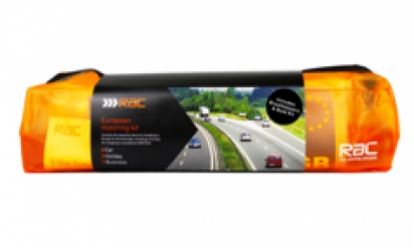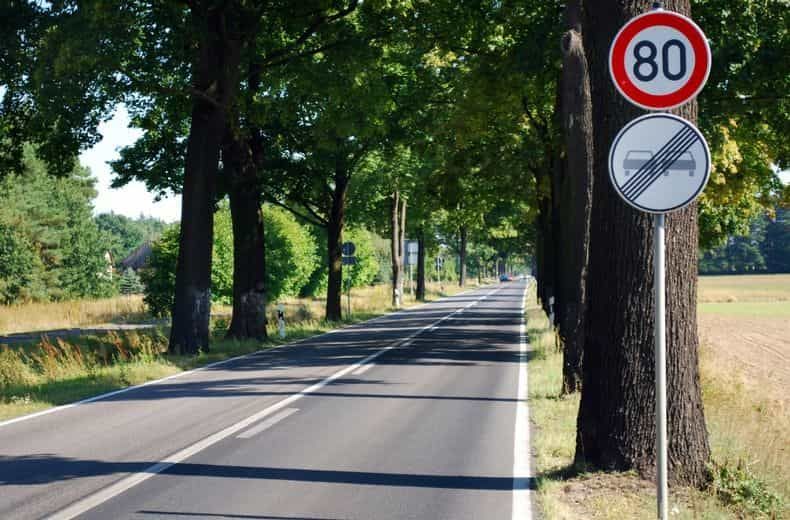Here at the RAC, we have summarised all the relevant information you will need for your French road trip.
Breaking the speed limit in France will likely result in being hit with a large fine, points on your licence, or worse – so stick to limits displayed on the road signs – no matter what type of road you’re on.
Before starting your journey, you will need to make sure you have all your relevant documents including your UK driving licence, V5C logbook, most recent MOT certificate, car insurance, UK car sticker, and European breakdown cover. Any driver in France, must have at least third-party car insurance to drive in the country.
All speed limits in France are in km/h rather than mph.
What are the speed limits in France?
Ahead of your trip to France, it is vital to familiarise yourself with the speed limits on the different types of roads.
| Road Type | Speed Lmit |
|---|---|
| Motorway | 130 kph / 80 mph |
| Dual carriageways | 110 kph / 70 mph |
| Main roads outside built up areas/A & B roads | 80 kph / 50 mph |
| Main roads within built-up areas | 50 kph / 30 mph |
Although these are the main speed limits – there are others you should be aware of.
The Boulevard Peripherique that surrounds Paris has a speed limit of 70 kph, while there are 30pmh default limits in the capital as well as Nantes, Lille, and Grenoble.
If you are taking your caravan to France, then there are also two speed limits. If the total weight is under 3.5t, then there is no difference to that of a normal car. However, if the total weight is over the threshold, then motorway driving is limited to 90 kph.
In the UK, there are variable speed limits that often come into force when something is impacting the road ahead. However, in France these only come into place when driving in wet weather.
The limits are reduced to 110 kph for motorways, 100 kph for dual carriageways, and 70 kph for other main roads. If there is a heavy fog, then some areas are reduced to a 50kph limit no matter the type of road until the weather has cleared.
- Driving in the EU after Brexit – everything you need to know
- Driving offences abroad – a guide to fines in Europe
- Overloading a car: impact, penalties and safety guide
Speeding fines in France
If you are caught speeding on French roads, whether by police, speed camera or another form of traffic enforcement, then you will be registered by the French government for breaking the law.
If stopped by police, you’ll receive an immediate fine. An offender could also have their licence confiscated, be banned from driving in France, or be arrested.
The car will need to be driven home by someone else or you’ll need to pay for it to be towed back to the UK.
Drivers caught speeding in France by camera will receive a letter within 100 days – and the longer you wait to pay it, the more it will cost you. However, if you pay it within 15 days, then your fine will be reduced.
| Exceeding limit by | Speeding fine |
|---|---|
| More than 50 kph | €1500 |
| 20-50 kph | €135 |
| <20 kph in a 50 kph zone (or less) | €135 |
| <20 kph a 50+ kph zone | €68-€135 |

Instant cover available
• 24/7 rescue at the roadside
• Help to get home if your vehicle can't be fixed
• 5 star Defaqto rated cover
*T&Cs apply.

If you need breakdown cover abroad for a short time, why not try our Single Trip European Breakdown Cover. Check out the RAC's dedicated services if you break down in France now.
Driving in France Kit from £25.99
Did you know you could be fined up to €530 for not carrying the right kit with you in France?


Be prepared ahead of your French road trip
Before you get in your car and head south, it is important to remember these important travel tips.
First of all, following Brexit, you will need a UK sticker on your car. Cars with GB stickers need to have them replaced with UK ones ahead of the journey.
Those of you driving through larger cities will need to purchase a French clean air sticker as they are now mandatory in certain areas. If you do not have one you may receive a fine or not be able to enter certain cities at certain times.
These clean air stickers, known as Crit'Air stickers, denote the level of emissions your vehicle produces, and is based on your car's Euro emissions rating.
There's a chance if you drive a slightly older car, it might not be allowed in to certain cities at certain times based on air quality levels on that day.
If you are on the motorway for a large period of your French road trip, you will notice many signs for toll roads. Although there are ways to avoid these as you travel south – it is less economical and longer to do so – so it is advisable to choose the quickest route.
For travellers looking forward to enjoying some French wine, beware of the lower blood-alcohol limit in France.
In England, Wales, and Northern Ireland the blood-alcohol limit is 80mg per 100ml of blood, however, in France it is 50mg per 100ml of blood (the same as in Scotland).
Also, for drivers with less than three years' experience, the alcohol limit has been lowered from 50mg per 100ml to 20mg per 100ml.
Also, do not be caught using a phone while driving – as it will result in a €1500 fine. Drivers are also not allowed to use hands-free or Bluetooth devices while behind the wheel. Ignoring this will result in a €135 fine.
Finally, the RAC has highlighted tips for drivers looking at travelling through France this year – it is important that all road users familiarise themselves with these ahead of your journey.
Stay safe, respect the speed limit – and have a great holiday!
- Speed cameras – how they work
- Speeding fines – how much you have to pay
- How to save fuel – the ultimate guide
When driving through France, be prepared with all the essential items required to travel through countries in Europe with a European driving kit available at the RAC Shop.

Instant cover available
• 24/7 rescue at the roadside
• Help to get home if your vehicle can't be fixed
• 5 Star Defaqto rated cover
*T&Cs apply.













